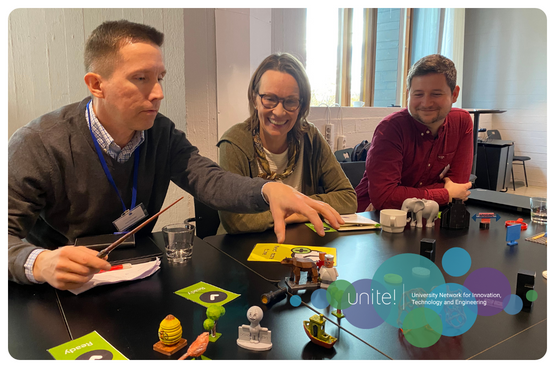Building up a European Open Science and Innovation University
The research work led by Rubén Vicente Sáez for Unite! European University Alliance culminated on October 24-25,2023 at Aalto University with the final Open Science Policy Forum.
In the Unite! H2020 project strategic tools and policy guidelines have been developed to advance the modernization of R&I governance models at universities in the digital era. The research work led by Rubén Vicente Sáez for Unite! European University Alliance culminated on October 24-25,2023 at Aalto University with the final Open Science Policy Forum that also gathered stakeholders from the Finnish Ministry of Education and Culture and the Federation of Finnish Learned Societies. This was the fifth and final policy forum that have taken place in different Unite! universities around Europe involving researchers, staff, university managers, and decision makers. The aim of the final policy forum was to explore how the new university open science and innovation governance model developed in the project can contribute to the solving of grand societal challenges and be scaled-up at European level.
“This governance model illustrates how university researchers can administrate, organise, and conduct open science and innovation in their research teams. It can also provide guidance on designing and setting up open science and innovation support services for the adoption of these practices at universities. This governance model can support university managers to develop university- and school-level actions, redesigns, and incentives for the effective administration of open science and innovation in universities”.
The results of the final open science forum will lead to the development of a white paper to guide Unite! university managers and policymakers on the adoption of this new governance model. The white paper will provide new directions for prescribing public science and innovation policy at regional, national, and European level on the transition from modern science to open science.
Co-Creating with Visual Storytelling, Deconstruction Philosophy, and User-Centered Design
The forum commenced with a strategic level co-creation session centered on enhancing collaboration with other European University Alliances. Professor Robin Gustafsson facilitated this engaging session, employing a participatory approach that incorporated visual objects to emphasize each participant's perspectives. The approach and tools have been developed in a research to business project Visentools at Aalto University. The forum continued with another tactic level co-creation session. Through a deconstruction process facilitated by Research Manager Rubén Vicente, the participants advanced a new set of objectives and indicators for advancing the role of Unite! in building a global open science system. The forum finalized with an operational co-creation session facilitated by Aalto’s Data Advisor, Antti Rousi, focused on understanding the impact of Unite! H2020’s project results in the Unite! universities. Maria.H Ribeiro from Ulisboa, Maxence Larrieu from UGA, Konrad Löbcke from TuDa, Anna Rovira Fernández from UPC, and Rosa Lönneborg, KTH, presented the results at their institutions.
The utilization of visual storytelling, deconstruction techniques, and user-centered design approach ensured that every participant's voice was heard, fostering a sense of collective contribution when finding solutions for the adoption of innovative open science and innovation practices, principles, and goals at universities in the digital era.
Why open science and innovation?
Open science is transparent and accessible knowledge, shared and developed through collaborative networks (Vicente-Saez and Martinez-Fuentes, 2018). It involves sharing ideas, data, methods, prototypes, reviews, and results with local, national, regional, and global collaborative networks of research participants. It also goes beyond this to encompass the scientific knowledge produced and used by these collaborative networks.
Open innovation is the use of purposive inflows and outflows of knowledge to accelerate internal and external innovation (adapted from Chesbrough et al., 2006; Chesbrough and Bogers, 2014). Novel open science practices for the sharing and production of knowledge have created extraordinary possibilities for this knowledge value creation and transfer process. These practices are expanding not only the ethos of science, but also the ethos of innovation in universities. Open science practices are transforming science and innovation practices in universities.
The adoption of open science practices, principles and goals can improve the quality of learning and creation of new knowledge, increasing trust in science, nurturing innovative and entrepreneurial people, and accelerating research and innovation processes for finding solutions to the grand societal challenges.
Project partners
The project partners included seven of the Unite! partner universities: Aalto University, KTH Royal Institute of Technology, Technical University of Darmstadt, Grenoble INP-UGA, Politecnico di Torino, Universitat Politècnica de Catalunya – BarcelonaTech and Universidade de Lisboa.


